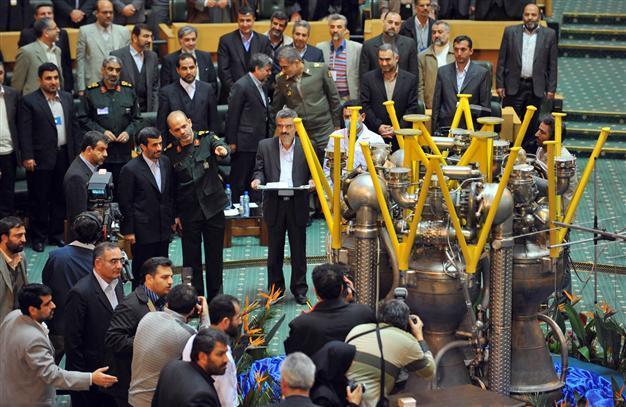Iran, world powers fail to settle nuclear dispute
MOSCOW

ran and world powers failed to narrow their differences over the Iranian nuclear drive after bruising talks in Moscow were held amid threats of a crippling oil embargo or even military action against Tehran.
The Iranian negotiating team and the world powers present, led by EU Foreign Policy Chief Catherine Ashton, succeeded in keeping talks alive, however, by agreeing to a process for future meetings.
“It remains clear that there are significant gaps between the substances of the two positions
Iran and world powers failed to narrow their differences over the Iranian
nuclear drive after bruising talks in Moscow were held amid threats of a crippling oil embargo or even military action against Tehran.
The Iranian negotiating team and the world powers present, led by EU Foreign Policy Chief Catherine Ashton, succeeded in keeping talks alive, however, by agreeing to a process for future meetings.
“It remains clear that there are significant gaps between the substances of the two positions,” Ashton told reporters in a late night news conference held after nine hours of talks on the second and final day of the meet. There had been “tough and frank” exchanges with the delegation, led by Chief Iranian Nuclear Negotiator Saeed Jalili, said Ashton, who represented world powers known as the “P5+1,” which includes permanent U.N. Security Council members Britain, China, France, Russia and the United States plus Germany.
Ashton said the world powers present reaffirmed their demands for Iran to stop enriching uranium to 20-percent purity, ship out the existing stock of such material, and shut down its heavily-fortified Fordo enrichment facility. “The choice is Iran’s,” she said.
“We expect Iran to decide whether it is willing to make diplomacy work, to focus on reaching agreement on concrete confidence-building steps, and to address the concerns of the international community,” Ashton said. Uranium enrichment is at the center of the decade-long Iranian nuclear crisis as the process can be used both to make nuclear fuel but also to make highly-enriched uranium for the explosive core of an atomic bomb.
‘Sanctions risk of derailing talks’“The fact is that they [Iran] did begin to address the substance for the first time, but there is a very long way to go,” Ashton said.
Jalili called the talks “more serious and more realistic” than the rounds held earlier this year in Istanbul and last month in Baghdad, according to Agence France-Presse. He also floated the possibility that the supply of nuclear fuel from abroad could form part of a deal in the future, but also indicated that Iran still wanted to enrich uranium to 20 percent. “We insisted on the fact that the enrichment of uranium for peaceful purposes to all levels is the right of the Islamic Republic,” he said. Jalili also warned that the wide scale oil export sanctions that the European Union and the United States were now both set to impose against Iran risked derailing the negotiating process. The European Union stated it will launch a full embargo on imports of Iranian crude oil beginning July 1.
But a senior U.S. administration official, speaking on condition of anonymity after the talks, said that there would be no softening of the sanctions against Tehran.
Ashton said an expert-level meeting would take place on July 3 in Istanbul, followed by another meeting between the deputies of Jalili and herself. A higher-level meeting involving herself and Jalili would follow at an unspecified later date and location, she said.
Middle East, P 5+1,
